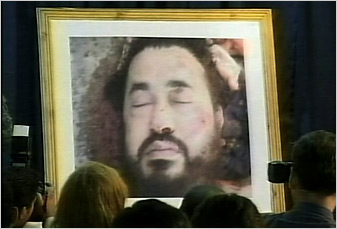 Well, we got al-Zarqawi finally. No one is quite sure how much difference it will make, and there is a lot less crowing than there was when Saddam was captured or his sons were killed. But still, if ever it is approrpiate to be happy to see someone dead, this is one of those times.
Well, we got al-Zarqawi finally. No one is quite sure how much difference it will make, and there is a lot less crowing than there was when Saddam was captured or his sons were killed. But still, if ever it is approrpiate to be happy to see someone dead, this is one of those times.The Zarqawi story has knocked right off front pages what would otherwise have been the biggest story of the day:Iraqi Parliament Selects Top Security Ministers:
The Iraqi parliament agreed upon candidates to lead the country's three top security ministries Thursday, ending a weeks-long stalemate among the country's largest political factions.Talk about bad serendipity, the poor NYT editorial page was made to look pretty silly on both of these counts. The Times' lead editorial today opened with this paragraph:
The selection of an interior minister, a defense minister and a national security adviser gives Iraq a complete government for the first time since elections in December 2005 and it provides a key opportunity to promote political reconciliation between members of the country's Sunni Muslim minority and the Shiite-dominated government.
Almost six months after Iraqis voted for their first full-term government, two of the most essential jobs in that government remain unfilled: the interior minister, who oversees the police, and the defense minister, who oversees the army. That would be a serious political crisis in any country. It is little short of calamitous for Iraq.Ooops! Never mind.
Bob Herbert then had a similar "never mind" moment when he used this piece of evidence in an op-ed argument that Iraq is beyond hope, that:
Instead of beginning to pull our troops out of Iraq, we are sending more in. The permanent Iraqi government, which was supposed to be the answer to everybody's prayers, is a study in haplessness. Abu Musab al-Zarqawi, Al Qaeda's man in Iraq, remains at large.Double oops!
The rest of the news is sorta thin, but here it is:
Iraqi Ties to Iran Create New Risks for Washington (NYT)And finally, on the lighter side:As the Bush administration seeks simultaneously to stabilize Iraq, in part by empowering its Shiite majority, and contain Iran, it must carefully navigate the complex relationship between the countries. It is not just Iran's influence in Iraq that the United States must confront, but Iraq's connection to Iran, as well.Hundreds of Iraqi Detainees Get First Taste of FreedomThe first of 2,500 Iraqi prisoners set for release stepped off a bus to freedom on Wednesday morning at Baghdad's central bus station, with many dropping to their knees and pressing their foreheads to the scalding pavement to offer thanks.Iranian President Signals Readiness to Negotiateranian President Mahmoud Ahmadinejad on Thursday signaled Iran's readiness to renew negotiations "to resolve misunderstandings in the international arena."Frontline Care for 'At Risk' Soldiers
The statement, while not specifically answering numerous outstanding questions about Iran's position, was the most straightforward indication so far of its willingness to engage six world powers, including Washington, in discussions aimed at ratcheting back the mounting confrontation over its nuclear program.ver the course of a year in Iraq, the 3rd Brigade of the U.S. Army's 3rd Infantry Division saw action in some of the country's most violent places, insurgent strongholds such as Ramadi in the west and Baqubah in the north. By the time the brigade's 4,000 members returned home in January, as many as 800 had been flagged as potentially "at risk" in a psychological screening process conducted in Iraq, according to commanders and medical personnel.
Yet four months after their return, fewer than 80 are still in treatment. Psychologists here attribute what they call a relatively small number of persistent psychological issues to an unprecedented program of battlefield therapy and follow-up care, including having mental health experts assigned to most brigades and combat stress experts deployed for the first time to frontline bases throughout Iraq.
Bush Wants To Borrow A Canadian Terrorist For Fall Elections
No comments:
Post a Comment